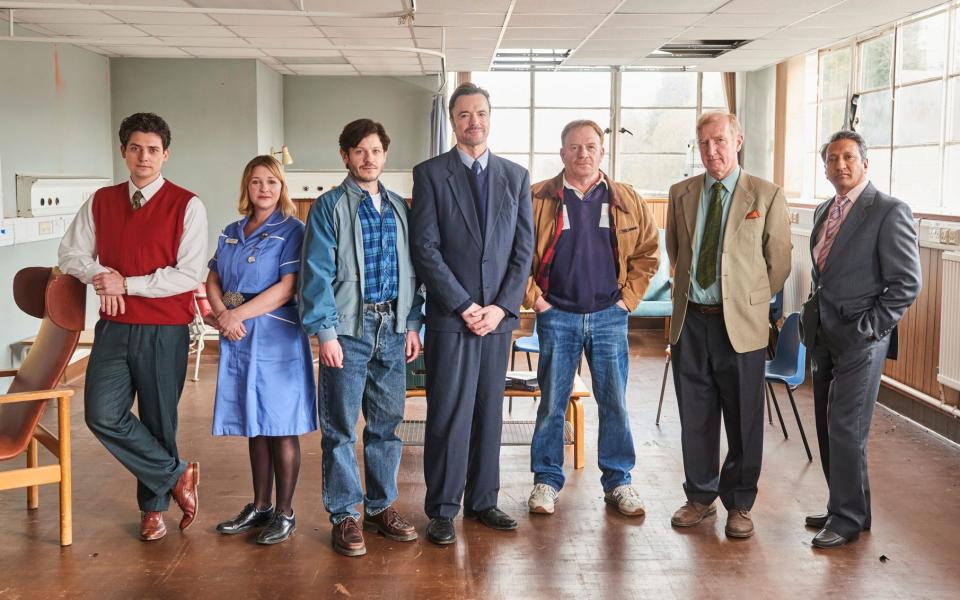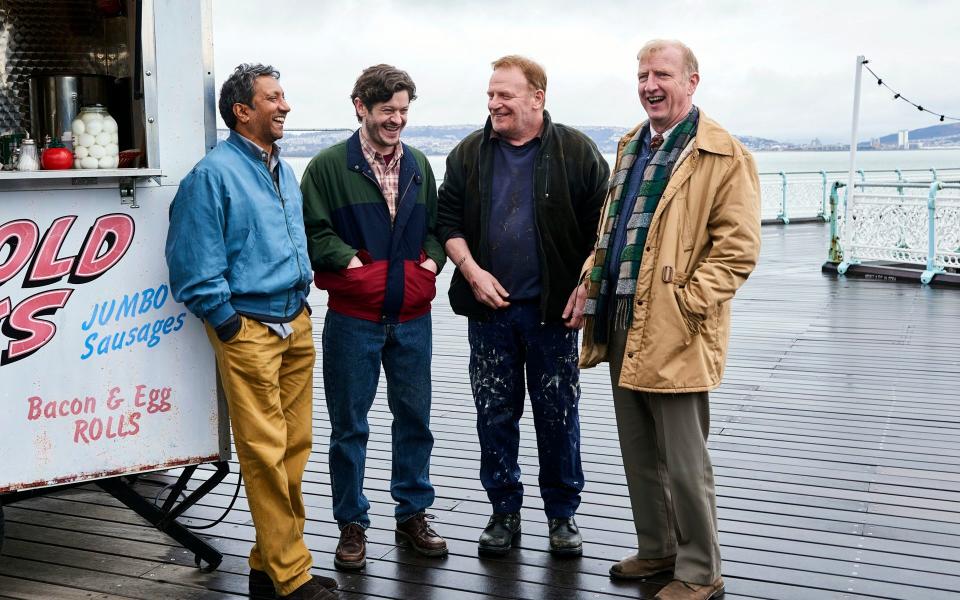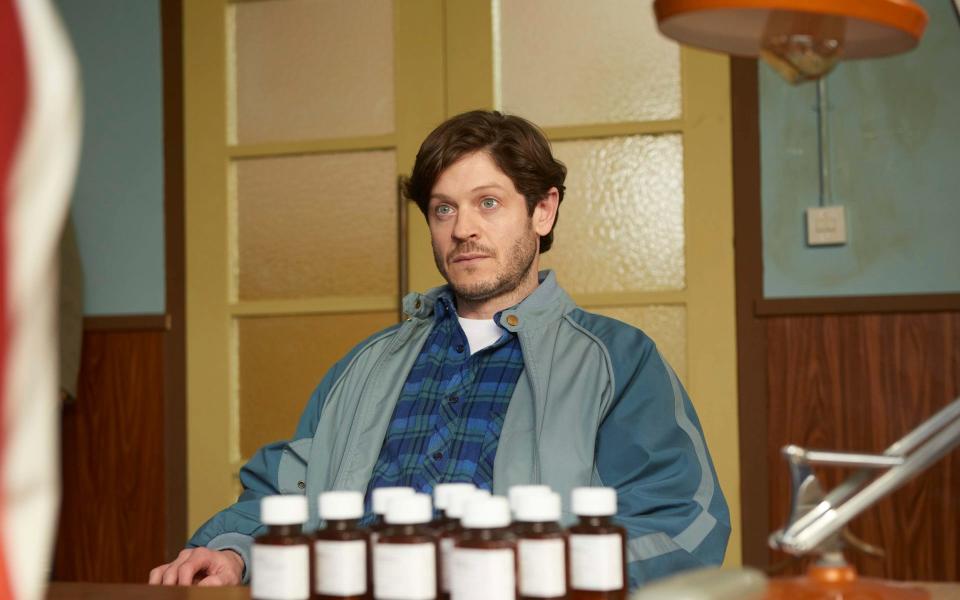How Viagra gave men everywhere a helping hand – even if they won't admit it


Once the formal questionnaires are complete, there’s an open enquiry at the end of almost any clinical trial. A variation on: ‘Apart from the answers you’ve given, did you notice anything else worthy of mention?’ Often the question is met with a blank. But on this occasion, in Merthyr Tydfil in the summer of 1993, the former miners testing a potential new drug for angina and hypertension did feel moved to speak up. One man raised his hand.
‘I seemed to have a lot more erections during the night than normal,’ he said, with admirable candour. Then, in a moment that doesn’t sound entirely dissimilar from the O Captain! My Captain! scene from Dead Poets Society, the others smiled and, one by one, said, ‘So did I.’ It’s not known what would have happened if that first brave man hadn’t piped up. Dr David Brown has a pretty good idea, though. ‘Well, Viagra wouldn’t have been invented, basically.’
The story of the drug sildenafil, later sold as Viagra (among other things) and marketed, ingeniously, as simply ‘the little blue pill’, is one of happenstance and determination – with a hefty dose of unexpected charm. Plenty of medicines can claim to have changed the world, but 30 years after its invention and 25 years after it was first sold, few have made the cultural impact of Viagra. Fewer still are so widely taken yet so seldom openly discussed.
That the invention of this magic pill for impotence was an accident – a phenomenally happy one, not just for the millions of men who needed it, and their partners, but also for the profit margins of Pfizer, the company that created it – is part of its mythology. As the drug’s co-inventor, Dr David Brown knows the story better than anybody. He was the young chemist based at Pfizer’s research laboratories in Sandwich, Kent, who in 1985 began working with a small team to look into ways to lower blood pressure.
Eight years later, long after the profile of a new drug they’d developed looked best suited as a treatment for angina, the group was struggling to unequivocally demonstrate efficacy, and fast running out of funds. Senior management issued Dr Brown with an ultimatum: three months to get results, or the project would be closed. Not long afterwards, those Welsh miners – not even angina patients, just volunteers in a pharmaco-kinetic study of how the drug moved through the body – stood to attention. And, boy, did they stand to attention.
(Incidentally, as if to reinforce how Viagra’s back story has been told and retold until the facts are clouded, another version of the origin tale, related by other Pfizer employees who weren’t even on the case at the time, focuses not on the miners’ speaking up, but on a clinical nurse noticing that trial participants were sheepishly lying on their stomachs when she’d checked on them. They were embarrassed by their arousal, the story goes, and she was perceptive enough to relay the side-effects. Dr Brown, now 74, dismisses this out of hand. He wouldn’t misremember it.)

‘I’ll never forget the face of the clinical nurse, who blushed a little as she told me what they’d all experienced,’ Dr Brown recalls. But there wasn’t a great deal of time to dwell on that. The very next day, he visited the Pfizer head of research and development, David McGibney, and demanded £150,000 to complete an impotence study. McGibney said no, so Dr Brown refused to leave his office until he had the funds. A while later he had them, and within weeks a second trial was arranged for a dozen impotence patients in Bristol.
The results were ‘stunning’, he remembers. In the pharmaceuticals industry, ‘unmet medical need’ is the term used for conditions for which there’s no satisfactory treatment yet, and impotence – or erectile dysfunction – was one chemists had identified for years, without success. Treatments, though they were barely treatments, at the time were mainly unsuccessful and often painful.
Meanwhile, previous attempts to develop drugs to combat the issue in the 1980s had focused on the brain. Wisely, those projects were abandoned when it was pointed out that the legal implications for a company developing a drug that promised to increase sex drive were extremely dodgy, should it be involved in a crime.
But sildenafil, by relaxing the muscles in blood vessels supplying the penis, and therefore allowing an increased flow, merely helped men achieve and maintain an erection – assuming they were already sexually aroused. It tackled the physical obstacle, rather than attempt to root out any mental one. This, inadvertently discovered by Dr Brown and his team, was the answer to the unmet medical need after all. Suddenly, Pfizer had a new project.
‘Put simply, pharmaceutical companies are interested in the biggest market they can get. Angina’s maximum sales were going to be 200 to 300,000 a year. Impotence was going to be 10 to 20 times bigger. So very quickly, they switched.’ Angina? We hardly knew ’er. ‘Incidentally,’ Dr Brown adds, ‘there’s since been lots of evidence it does work for angina, it does protect the heart, but of course nobody’s doing the studies on those…’
In the months and years afterwards, dozens of different trials took place all around the world before Viagra could come to market in 1998 – including another in Wales, at Swansea’s Morriston Hospital. Yet the success that followed, the sheer number of pills sold (Pfizer says 62 million men took it in the two decades after it was launched; sales were more than a billion dollars every year) and the sexual nature of the issue it treated meant that the men whose lives were sincerely changed by its invention have often gone overlooked.
That changes this Christmas.
A new feature-length BBC drama, Men Up, tells the story of five ordinary Welshmen who take part in the trial at Morriston Hospital. Written by Matthew Barry and with Russell T Davies as executive producer, it has been lightly fictionalised but includes many of the key elements of those later sildenafil trials on patients suffering from impotence. Despite growing up in Cardiff, Barry had no idea Viagra was so tied to South Wales.

‘One of my first thoughts was just, “Why has nobody done this before?” It felt like such a no-brainer,’ Barry, 37, says. ‘Then as we moved through the process, what I realised is that people hear the word “Viagra”, they hear the word “impotence”, and they wait for the punchline. But actually, men take their own lives over [impotence] on occasion. And it’s a really serious thing that affects marriages and relationships. So it seemed so ripe for drama.’
Barry’s early concept for the script was ‘The Full Monty with Viagra’, but he understandably felt ‘the tone of a story like this is so important’. Viagra does, after all, dance on the line between drama and comedy. Writing about the topic without accidentally making a pun is hard, as this sentence demonstrates. Talking earnestly about erections on Zoom with Barry, who lives in Los Angeles, my eye is drawn to a book behind him: Be More Sausage. It’s a celebration of dachshunds, but still.
‘It was such a balancing act, because it is funny. Knobs, things like that. People laugh. But the key is that we’re never laughing at these people, we’re laughing with them, and they’re kind of in on the joke. There’s a lot of camaraderie between the fictionalised men on the trial. But that’s life, isn’t it? It’s hilarious and tragic all at the same time.’
Wisely, the almost all-Welsh cast is drawn from both worlds. Alongside lead Iwan Rheon (best known as Ramsay Bolton in Game of Thrones) and Aneurin Barnard (Dunkirk) are Joanna Page and Steffan Rhodri – best known as Stacey and Dave Coaches from Gavin & Stacey. They play characters whose identities and relationships are fictionalised by necessity: patient confidentiality means the names of the real participants aren’t accessible. Yet many elements of the trial at Morriston Hospital are replicated more or less faithfully.
Helping to make it so was Dr David Price, who was appointed to Morriston as a consultant physician with an interest in diabetes in 1992. Diabetes, which affects the blood vessels and nerves, is the most common cause of impotence, with up to 75 per cent of diabetic men experiencing some degree of erectile dysfunction.
‘It was an area of medicine that was completely neglected, there was this myth that even in diabetic men, impotence was psychogenic – that you could treat it with counselling,’ Dr Price, who is now retired, recalls.
At the time he was one of a handful of doctors in the UK making any noise about the link between diabetes and impotence. Pfizer heard, so approached him in 1994 to run a sildenafil trial in diabetic men. That trial, at Morriston, provides the setting for Barry’s drama.
Viagra is now prescribed ‘straight away’ when men with diabetes report erectile dysfunction, and Dr Price ended up travelling the world talking about his work. At the time, though, he had no idea how the drug would fare. ‘We got lucky,’ he says, ‘the very first person who took it responded fantastically, so straight away we were on to a winner. It was very exciting.’
He’s pleased with the BBC drama, and visited the set a few times. ‘They’ve got the whole tone and ethos completely right.’ His contribution was ‘to put on paper as many anecdotes as possible’, which went on to inspire moments in the script, many of them comic. ‘Showing men erotic videos with a strain-gauge attached to their thingummies… It is very funny.’

The trial did indeed have an inherent element of farce, Barry says. ‘There’s so much [true] stuff we couldn’t include, like it was originally meant to take place in a hospital run by nuns, but Dr Price realised this is not the kind of trial you necessarily want nuns running,’ he says.
‘And Pfizer had sent him some porn, but it was terrible VHS quality, so he had to scuttle down to the sex shop in Newport, only he couldn’t face going in alone so took his wife in with him… Then you realise all this is taking place in working-class Swansea and it just elevates it all.’
Russell T Davies, who brought us It’s a Sin and Queer as Folk as well as many series of Doctor Who, was there to ‘crack the whip’ on the series, giving notes on the script and helping Barry hone the characters. Both men spent their early lives surrounded by the kind of working-class, South Walian men who’d have been on the sildenafil study: tough men, taciturn men, men very much of their time. They rarely talked about much, but they definitely didn’t talk about the blood supply to their penises. Not to their wives, and definitely not to their friends.
‘As I went along with Men Up, I came to the conclusion that this is a drama about Viagra, of course it is, but it’s not really, it’s a drama about men unable to talk to men. Men unable to talk to their partners, that’s what it’s really about,’ Barry says. ‘And we’ve got a lot better as a society about mental health and talking about it in men. In 1994, though, it didn’t really exist. This is a drama about men learning to talk.’
What Viagra promised – or at least what many men felt it would surely deliver – is for some couples to regain a sense of closeness denied them by impotence. ‘A lot of the men weren’t necessarily interested in an erection for an erection’s sake, it was so that they could reclaim the intimacy and relationships with their partners,’ Barry says. Many of the characters in Men Up are propelled by that yearning, even if their partners aren’t nearly so desperate.
In the real story, this became apparent early on to Dr David Brown. Men participating in some of the earliest trials were given packets of sildenafil pills, but were only permitted to take seven doses – then they were required to hand the packets back to the clinicians.
‘Some of them wouldn’t give the tablets back, as you can imagine. We were chasing them, and then I think on a Monday morning there was a letter on my desk from one of the patients. It still hurts me to think of it now. He said, “Look, I know it’s wrong and I signed a legal document, but you’ve got to realise, this is the first time in 25 years that my wife and I have had a sex life. Do you really expect me to give these tablets back?” That really brought home to me the impact it was having.’
Legally, Dr Brown’s team was obliged to get them back, given the drug wasn’t yet ready for sale. ‘But what we did was promise the people in that initial study that they would be the very first people recruited into the [later, longer-term] study.’ And they were true to their word: many men were desperate to return and help with more home-based research, so did.
Like many inventors who slave for years over their prototype, Dr Brown and his colleagues had to accept it was other people’s job to market sildenafil. And so Viagra was born. Did Pfizer give it the name because ‘vi’ suggested vitality, vim and vigour, or because the Sanskrit word for tiger is vyāghra, or because it rhymes with Niagara, as in Falls, which connote endurance and gushing strength? Ask three people, get three answers.
But it is safe to say it took off. ‘The drug marketed itself,’ Dr Brown says, ‘they almost had to dampen down the interest. Pfizer was worried it would be seen by the FDA as a lifestyle drug, rather than a real medical need, and also that they wouldn’t be able to advertise it without it seeming like a blue movie type thing.’
Pfizer was careful not to focus on ‘sex’, but instead on ‘relationships’, and didn’t dwell on the mechanics of the product. Famously, the US presidential candidate Bob Dole appeared in adverts for Viagra in 1998. ‘You know, it’s a little embarrassing to talk about ED,’ said Dole, then aged 75. ‘But it’s so important to millions of men and their partners.’ Sales rose, and Viagra entered the mainstream.
Today, there are no jokes made on late-night talk shows about Viagra. It is not a pill associated with Hugh Hefner types (though Hefner took it by the pail-load), but anybody. Ben Affleck, Ashton Kutcher and Freddie Flintoff have admitted taking it, and they’re all well under 55. By 2017, as the cost of the little blue pills fell thanks to counterfeiting and Pfizer’s expiring patent, the number of prescriptions for Viagra had nearly tripled on the NHS. A couple of years later, when that patent did run out, rival sildenafil products flooded the market.
(A newspaper article appeared in 2019 with the headline, ‘The race to replace Viagra’, asking what Pfizer might do next to sustain its profit margins. What it would do next, of course, is earn nearly $37 billion in 2021 selling a vaccine to help end a global pandemic. This became one of the most lucrative products in history.)
Dr Brown isn’t ‘the kind of person who feels pride. I always feel I’m as good as my next drug, not my last one’, and is still inventing new medicines with his Cambridge-based company Healx, which uses AI. ‘We might have the first safe drug to treat cancer, using machine learning. We’ll be doing trials in America next year,’ he says, cheerfully.
Yet he is still pleased with sildenafil: he takes it to improve his memory and hopefully ward off dementia, as some studies have suggested it may do. Other people use it for hypertension or Raynaud’s. Diego Maradona, who took it for its primary purpose four times a day when he had a particularly young girlfriend, made the Argentina football team pop the pills to combat altitude sickness when he managed them.
The stigma around Viagra seems to have evaporated, but the question that has always followed it is whether it truly made good on its promise. It helped many men, not least those diabetes patients, and it changed sex for ever. But did it make men happier? Men Up doesn’t shrink from that issue. Barry admits there are versions of the story that turn it into an all-singing, all-dancing celebration of hard-won erections and saved marriages. That isn’t the reality, though.

‘There is a book called The Viagra Myth about the group of people who take a pill, get an erection, and think all their problems are fixed – but they’re not,’ he says. ‘In some cases the answer is more that you need to talk. That’s what’s going to fix you.’
It’s just as true of the increasing number of younger men using sildenafil (now available online for as little as 70p a tablet) as an answer to a problem that may be psychological. Viagra has been taken recreationally by young people for years, both as an additional stimulant – ‘sexstasy’ is one combination of MDMA and sildenafil that was popular for a while – and as a means of performing while inhibited by other substances. Increasingly, though, studies have shown links between erectile dysfunction and pornography use in young people, causing some experts to consider the issue a matter of ‘arousal dysfunction’ instead being a strictly physical ailment. Without the porn, it’s thought, the prospect of real sex would easily be stimulating enough.
Dr Brown makes no claims to expertise in that subject, but he does come to the same conclusion. ‘The bigger problem may not be physiological, it may be psychological, in that these youngsters might start worrying if they didn’t take it, they couldn’t perform properly,’ he says.
He may be the co-inventor of a sexual revolution, he urges against seeing it as a panacea. ‘I think the mind has an enormous effect on sex for women, but actually I think it’s true a lot more for men than people realise. The relationship really matters. And if the relationship is bad, Viagra isn’t going to sort things out.’
So perhaps the stigma hasn’t quite evaporated after all. Barry claims he doesn’t know anybody who takes sildenafil, but then he checks himself, ‘I do know people who take it, they just haven’t told me. Statistically, we all do. But it’s one of those things that still, in 2023, has a bit of shame attached to it.’
The story of Viagra is, he says, ‘so extraordinary, and known the world over’ but what he hasn’t made is an advert for a pill on its 30th birthday. Instead, ‘the message is: talk about it. That’s what I want people to take away from this.
When these men do talk about it, the world doesn’t end, and they get some sort of relief. And sometimes that might just be accepting that not 100 per cent of drugs work for 100 per cent of people 100 per cent of the time. But I think all that starts with talking. That applies to Viagra, but it’s universal, really.’
Men Up is on BBC One and iPlayer on 29 December at 9pm
Recommended
How to talk to your partner about erectile dysfunction

